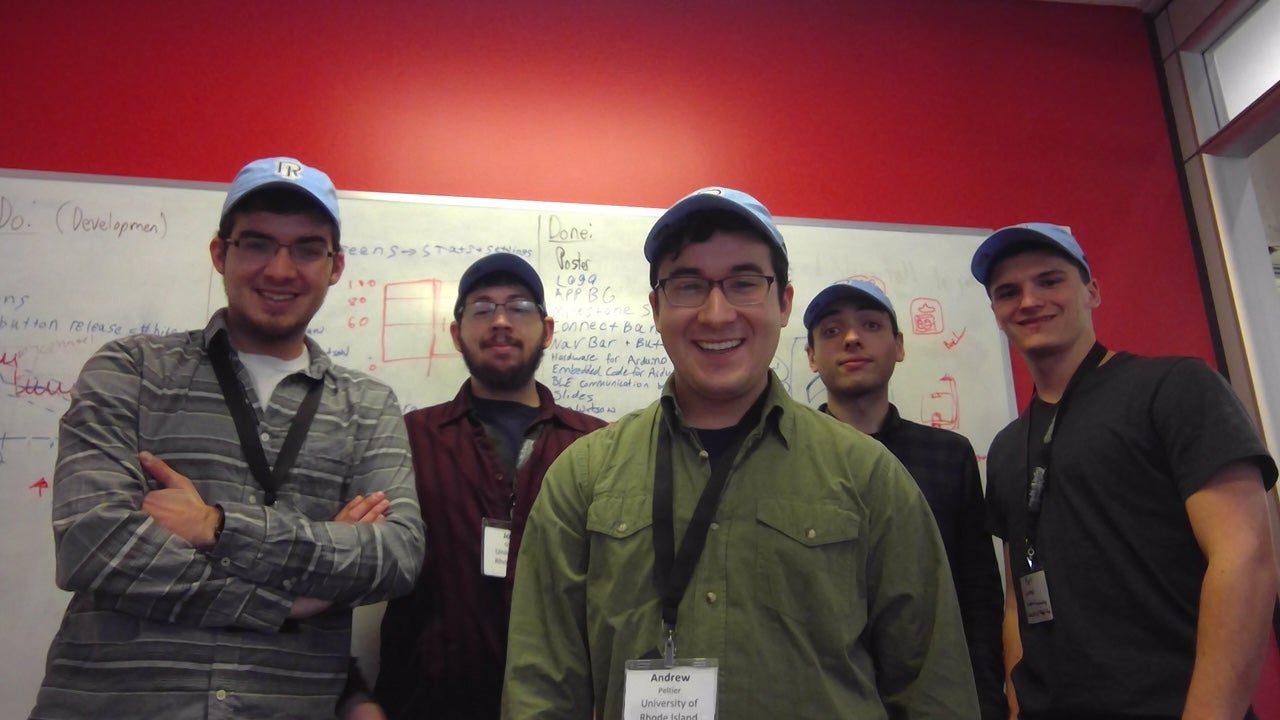KINGSTON, R.I. — April 27, 2017 — The U.S. Surgeon General, the U.S. Centers for Disease Control and Prevention and the American Lung Association have all cautioned American consumers about e-cigarettes or vapes as a safe alternative to tobacco.
But what if an e-cigarette, re-engineered with two tanks and paired with a smart phone or watch, could help wean traditional smokers or those who smoke e-cigarettes from their nicotine addiction altogether?
That concept and eventual prototype device, called Vapegate, led to five University of Rhode Island students capturing second place in the Health Tech Hackathon 2017 hosted by Cornell University. Fifteen college teams competed, with a team from Cornell finishing first.
URI’s team members are: senior computer science majors Nicholas Peltier, of Coventry, and Kile DaSilva, of Warren, who will both graduate in May; Josh Gyllinsky, a graduate student in computer science; Nicholas’ brother, Andrew Peltier, a computer science major; and Matthew Constant, a junior computer engineering student from West Warwick.
The strong finish was not the first for Nick Peltier. He and his brother were part of a team at HackRI, during which they came in second for an application called “Cubbie,” a bar code, scanner-based mobile application that would recommend recipes to users based on ingredients they had in their homes.
This year, the effort was personal for Nick. “I am a smoker and I have tried to quit smoking quite a few times. This device allows a smoker to get constant feedback on how he or she is doing. It could collect data on your heart, and the device will start to lessen the amount of nicotine you are taking in,” Peltier said.
Gyllinsky said the device, which the team said provides a gateway “from” smoking, automatically regulates the amount of nicotine the user ingests. Patches and nicotine gum can’t be regulated in the same way, team members said.
But it wasn’t easy to develop a strong concept for the competition. “We went through 15 ideas before we got to the hackathon,” Gyllinsky said. “We have proven ourselves.”
Preparing for the competition, which included a presentation to competitors, mentors, and judges, meant long days and nights. These students are used to that, often spending similar time in the Carothers Library and Learning Commons, which is home to Concept.URI visualization space, and the Space.URI, maker space, which provides URI students with 3D modeling and printing tools.
Dee Dee Chatham, program director for entrepreneurship and innovation at the URI Business Engagement Center, said this was an important competition for URI and that Johnson & Johnson supported the team with food, lodging and transportation for the three-day event in New York City.
“Johnson & Johnson is creating a new health technology center in Rhode Island and plans to hire 75 people,” Chatham said. “Company representatives came to campus recently to scout URI’s computer science talent.”
Beyond URI’s strong finish, the Johnson & Johnson affiliation with the University is paying off in other ways. DaSilva, who will also graduate from URI in May with majors in computer science, cybersecurity and Japanese, has already been hired to work in the company’s automated testing facility in Providence.
“This is a great opportunity for me,” he said.
DaSilva said working with and among such talented students at the hackathon was exciting.
“We used all we learned in college, and our teamwork was critical because the competition was fierce,” DaSilva said. “You think to yourself, ‘Wow, everyone here is so good, you don’t want to be awful.’”
“One of the goals of our participation was to show Johnson & Johnson that we have some serious talent at URI,” Nick Peltier said. “Personally, it was also an opportunity to develop partnerships.”
Peltier said he and his mates were surprised by their second-place finish. “We hadn’t gotten much sleep, so when they were making the announcements about the winners, I started clapping for the second-place team and then realized it was us,” he said.
URI’s success in hackathons is a direct result of the students’ collaboration with Kunal Mankodiya, assistant professor of electrical, computer and biomedical engineering, who was a key organizer of a URI health hackathon last semester. Mankodiya’s Biosensing Lab is winning international acclaim for its development of smart textiles, wearable items like gloves and socks—that help people monitor their health from their homes.
“By working with innovators like Mankodiya, our students are actively solving important problems in the real world,” Chatham said.

